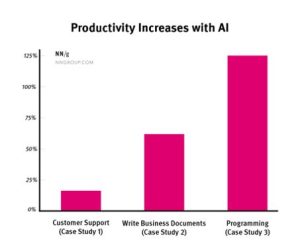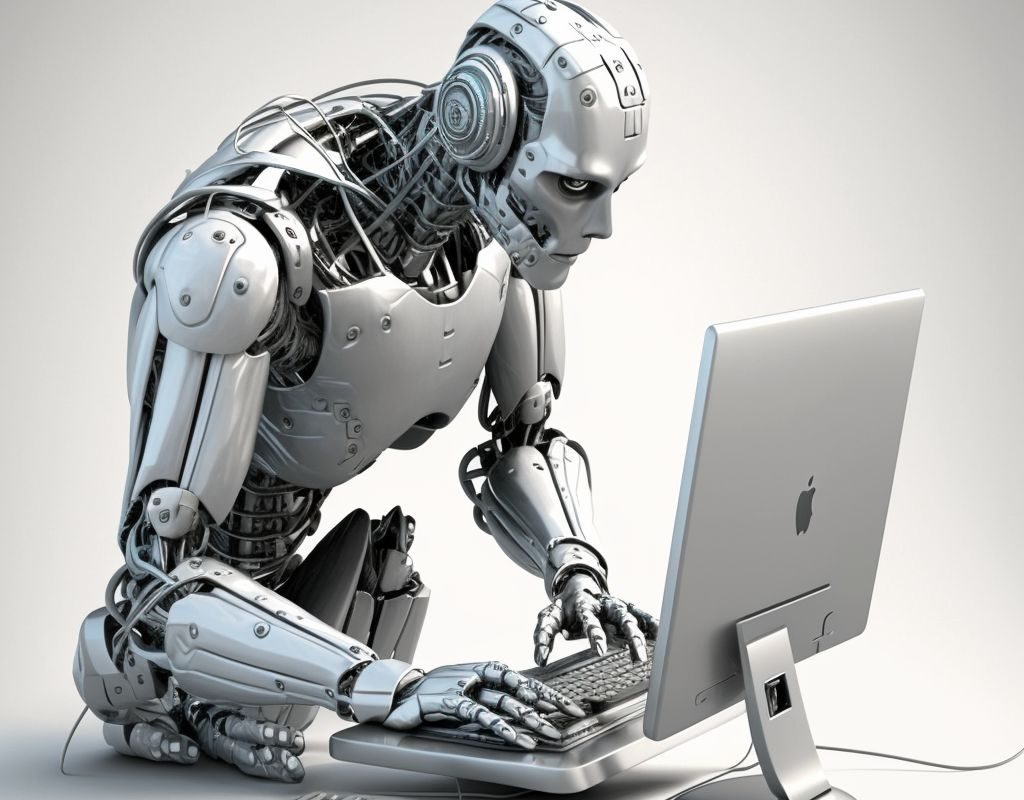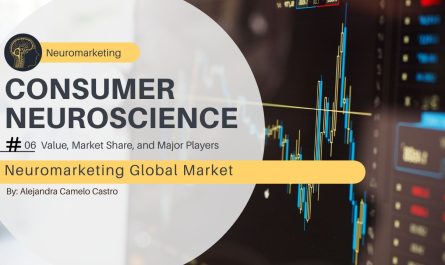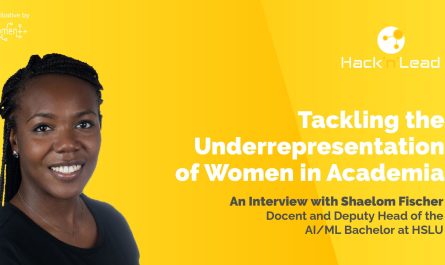Will AI Replace Researchers?
AI is expected to help speed up and enhance the discovery process, but it won’t replace human researchers. Some believe that AI won’t replace researchers because it lacks the necessary creativity, critical thinking, and specialized expertise. However, AI is useful for routine data science tasks, such as basic analysis and data preparation. It also speeds up research discoveries. For instance, AI helped analyze genetic data in the Human Genome Project, aiding in the identification of genes linked to hereditary diseases.
Some researchers believe that AI is not very accurate in fields other than computer science and lacks deep understanding. For instance, when AI takes the place of humans in qualitative research, it often misses local details and subtle context that are typically captured by these methods. Also, AI needs humans to select and organize its training data, and the way this is done can influence the AI, reflecting the values of the people who set it up.
Which Jobs Can Be Replaced By AI?
“The relationship between humans and AI is not a competition, but a partnership. Together, we can achieve more than either of us could alone.” [1]
The video “A.I. Tries 20 Jobs | WIRED” explores how artificial intelligence (AI) is good at jobs involving data, organization, and finding patterns but not as good at jobs needing creativity (Creative Intelligence), understanding people, and empathy.
Some comments in the videos:
- “Can AI do my job? I don’t think it’s there yet,” said the doctor.
- “So can AI do my job? I would say, have self-help books done my job? People don’t lack knowledge; they lack the ability to follow through,” remarked the therapist.
- “It’s a little creepy. It has the cadence right, which is fascinating to me… and it’s creeping me out. I’m not concerned yet. It can take a crappier comedian’s job, but not mine,” quipped the comedian.
- “If you want to have a truly bespoke cocktail, you gotta go see a bartender,” stated the bartender.
- “If this were a legal associate, I would say go back and do a better job,” critiqued the lawyer.
- “An AI program cannot do my job, but it’s very close,” conceded the influencer.
This shows us how AI and humans can work together well or badly in the workplace depending on the job.
This blog post talks about the partnership between AI and humans in research. AI can handle the repetitive tasks, which lets researchers focus on the more complex parts of their work that need creative thinking and understanding emotions. We’ll talk about how important it is for researchers to learn how to work in a world where AI is more common, what tasks still need human touch, and what the future looks like for jobs in research involving AI.
By understanding what AI can and can’t do, researchers can use AI to improve their work, make their tasks easier, and help their field grow. Let’s dive into how AI and humans can join forces in research to open new doors for innovation and progress.
Job Losses Due To AI Today And In The Future
“The development of full artificial intelligence could spell the end of the human race.” – Stephen Hawking
According to this statistics the future doesn’t look too rosy.
| No. | Current Statistic | Impact on Employment |
| 1 | 14% of workers claim to have already lost a job to ‘robots’ (Robotics). | Ongoing Job Displacement |
| 2 | In May 2023, 3,900 US job losses were linked directly to AI. | Immediate AI Job Impact |
| 3 | British Telecom aims to replace 10,000 staff with AI within 7 years. | Corporate AI Workforce Plan |
| 4 | Early AI and automation have already driven down wages by up to 70% since 1980. | Historical Wage Impact |
| 5 | Now it’s Educated, white-collar workers that will be impacted by automation. | Evolving White-Collar Job Impact |
| 6 | 81% of office workers think AI improves their job performance. | AI’s Positive Workplace Influence |
| 7 | 30% of workers fear their job will soon be replaced by technology. | Worker Job Displacement Concerns |
| 8 | More than half of 18 to 24-year-olds are concerned about AI taking jobs. | Generational Employment Worries |
| 9 | 81.6% of digital marketers believe content writers will lose jobs because of AI. | Content Creation Industry Concerns |
| 10 | CEOs of AI firms like OpenAI have signed an open letter warning about the risk of extinction from AI. | AI’s Broader Societal Impact |
Source: Changes in Job Market [7]
While experts are cautious about job losses due to AI, the overall impact may not be entirely negative. A McKinsey Global Institute study from 2023 suggests that AI could add as much as $1.2 trillion to the world economy by 2025, mostly by making many industries more productive [4].
Yet, job cuts in different industries like manufacturing and content creation are becoming more common as machines start to do the work [2][5]. A Pew Research Center survey shows that 30% of workers worry about technology replacing their jobs [8]. Young people are especially concerned; a Deloitte study from 2022 found that over half of those aged 18 to 24 are worried about AI taking over jobs [9].
Still, many workers view AI as something that can help them do their jobs better, not something that will take over completely. A 2023 Forrester Research report found that 81% of office workers think AI has made them more efficient at work [6][7]. The main message here is that AI is changing the job market, and workers need to learn new skills to keep up [3].
Table of contents
- The AI-Human Alliance in Research: Complementary Forces
- The Power of Lifelong Learning in an AI-Driven World for Research
- 7 Courses For Researchers and Scientists Who Want To Use AI For Their Research
- A New Breed of Competitors: The AI-Empowered Workforce in Research
- Tasks AI Will Never Truly Master
- AI for Research: Addressing the Limitations and Risks
- Navigating the AI for Research Job Market: Opportunities and Challenges
- The Future of AI for Research: Embracing the Opportunities
The AI-Human Alliance in Research: Complementary Forces
AI is becoming a big part of research, and it’s important to see how it can work well with people. AI can do the routine tasks, making processes quicker, which lets researchers concentrate on the parts of their work that need creativity, deep thinking, and understanding feelings [9]. This way, people and AI can use what they’re good at to make research better and more satisfying.
For example, AI can quickly go through big amounts of data to spot patterns and trends that would take people much longer to find. A report by the McKinsey Global Institute shows that AI can automate (Automation AI) jobs like gathering and looking at data, giving researchers more time for important work [10]. This saves researchers time and lets them focus on understanding results, thinking of new ideas, and planning creative experiments. By using AI tools, researchers can get more done and help make new discoveries in their fields [11].
The Power of Lifelong Learning in an AI-Driven World for Research
Automation is going to cause unemployment, and we need to prepare for it.” – Bill Gates
To stay ahead in our fields, we need to keep learning new skills [12]. It’s about keeping up with tech trends and knowing how to apply them in our work. The World Economic Forum says that being able to learn new things is going to be very important for doing well in the future [12].
Also, working with others is important when using AI. Bringing together people from different areas can lead to new ideas and improvements in our work. A Harvard Business Review study found that diverse teams are more creative and solve difficult problems better [13].
And, we should welcome change, not be scared of it. It can be a chance to grow and get better. Forbes says that people who can adapt and accept change have a better chance of doing well in a fast-changing work environment [14].
So, let’s keep on learning, working together, and being open to change. This way, we can make the most of AI and change the way we do research. Are you ready to be part of the continuous learning movement?
https://poll.fm/12109858
7 Courses For Researchers and Scientists Who Want To Use AI For Their Research
This recent blog post is about 7 Chrome extensions that you can use for your research.
To make the most of this AI-human alliance, researchers should continuously develop their skills and stay up-to-date with the latest AI advancements. Udemy, Coursera and Skillshare offer several courses designed to help researchers become more familiar with AI tools and their applications in research. These courses include:
- Complete Machine Learning & Data Science Bootcamp 2023: This course is a comprehensive and hands-on program that helps participants learn data science and machine learning from the ground up. Course participants will learn how to successfully conduct data science projects and apply them in practice. The course covers two areas: programming skills are not required as Python is taught from scratch, and for those who already have programming skills, there is the option to skip the Python section. The course includes practical applications such as machine learning on time-series data, data preparation and analysis, as well as the use of Scikit-learn and other libraries in projects.
- Open AI’s Generative Pre-trained Transformer 3 (GPT3): Harness power of OpenAI ChatGPT3 in your work and study: In this course, you will learn how to build next-gen applications with OpenAI’s powerful models, including GPT-3 for natural language tasks, Codex for translating natural language to code, and DALL·E for image creation and editing. With a simple API call in Python, you can harness the power of these AI models to enhance your research capabilities.
- Artificial Intelligence A-Z™ 2023: Build an AI with ChatGPT4 is a comprehensive course that combines the power of data science, machine learning, and deep learning to create powerful AI for real-world applications. This best-selling course teaches learners how to start building AI with no previous coding experience using Python, merge AI with OpenAI Gym to learn as effectively as possible, and optimize AI to reach its maximum potential in the real world. The course covers various AI models such as Q-Learning, Deep Q-Learning, Deep Convolutional Q-Learning, and A3C. The course includes downloadable Python code templates for every AI built, intuition tutorials, and real-world solutions. The course is suitable for anyone interested in artificial intelligence, machine learning, or deep learning.
- The AI for Scientific Research course is a 4-part course that teaches beginners how to use AI to discover trends and patterns in datasets. It covers topics such as data science, machine learning, and random forests. The course includes practice labs and a capstone project that analyzes genome sequences. Taught by expert Sabrina Moore, this course is a great starting point for those pursuing a career in data science.
- The Specialization in AI for Medicine is a three-course program that focuses on applying machine learning to medical problems, including diagnosis, prognosis, and treatment. The courses cover topics such as 2D and 3D medical image data, tree-based models for patient survival estimates, and natural language extraction for labeling medical datasets. The program is taught by Pranav Rajpurkar and is recommended for those with some experience in deep learning. Upon completion, you will receive a career certificate from DeepLearning.AI. Financial aid is available, and the courses have received positive ratings from past students.
- The Machine Learning for All course, taught by Professor Marco Gillies, is a 4-module course designed to provide an introduction to machine learning without requiring programming. The course is suitable for beginners who are interested in learning about machine learning concepts, such as how data affects the results of machine learning and how to train a machine learning model using a non-programming based platform. The course also covers the benefits and dangers of machine learning to society. The course is practical and includes a machine learning project where learners collect a dataset, train a model, and test it. The course is suitable for anyone who wants to understand the basic concepts of machine learning and how it can be applied to real-world problems. By the end of the course, learners will have a solid understanding of the basic ideas of machine learning and how it works.
- The “Machine Learning Models in Science” course is part of the “AI for Scientific Research” specialization. It is designed for individuals interested in applying machine learning techniques to scientific problems. The course covers the complete machine learning pipeline, from reading in, cleaning, and transforming data to running basic and advanced machine learning algorithms. Participants will learn about data preprocessing techniques, including PCA and LDA, and the fundamental AI algorithms of SVMs and K-means clustering. The course also covers advanced methods such as random forests and neural networks. The final project involves comparing different machine learning models in Python to predict diabetes from health data. The course is taught by Sabrina Moore and includes 11 hours of video lectures, quizzes, and readings. The course is suitable for individuals with some experience in Python programming and basic knowledge of statistics.
By embracing the complementary nature of AI and human expertise, researchers can unlock the full potential of this alliance, paving the way for a new era of research that combines the best of both worlds.
✅Sign up to be notified when a new blogpost is published featuring AI Tools here
A New Breed of Competitors: The AI-Empowered Workforce in Research
“AI doesn’t have to be anti-human. It can be a tool that humanizes society through reducing drudgery and empowering people.” – Max Tegmark
AI isn’t necessarily taking jobs away, but it can give a big advantage to researchers who use it well. By using AI, researchers can improve their skills and do more work, which can make them stand out compared to others who don’t use it. It’s really important to be open to new technology and take advantage of the opportunities it offers in the world of AI today.

The Inimitable Human Touch in Research: Tasks AI Will Never Truly Master
AI can’t do everything. There are things that only humans can do, especially in research, because of our creativity, ability to understand feelings, and intuition. Here are some areas where humans are still essential:
Creativity in Art: AI can create art using data, but it doesn’t connect emotionally or authentically like human artists. Humans can come up with new ideas, plan unique experiments, and solve tough problems with creativity that AI can’t match. A University of California, Berkeley study shows that human creativity comes from a mix of knowledge, imagination, and critical thinking, which is hard for AI to copy [15].
Emotional Intelligence (EI) – Understanding and Sharing Feelings: AI is good at handling data and making logical choices, but it can’t empathize. In research areas like psychology, sociology, and anthropology, where human interaction is key, the ability to feel and share emotions is very important. Researchers must understand people’s personal experiences, connect with them, and handle ethical issues with sensitivity. The Harvard Business Review emphasizes the role of emotional intelligence in research, especially for teamwork, communicating ideas, and gaining trust from participants [16].
Complex Decisions: AI can sort through a lot of information and give advice based on what it finds, but it’s not great at grasping complex situations. Humans can think about morals, ethics, and long-term effects when faced with tough choices. Researchers often deal with problems that need more than data; they need context, critical thinking, and ethical judgment to make good decisions that think about both risks and rewards. A study by the Massachusetts Institute of Technology shows that while AI helps with analyzing data, human expertise is crucial for making complex decisions, especially when ethics and unexpected results are involved [17].
AI for Research: Addressing the Limitations and Risks
Yes, I know, it’s not the most exciting topic, but trust me, it’s important. AI is transforming research, but it’s not perfect. It has some weak spots, and we should be smart about dealing with them [18]. Here are some important things to think about:
- Data Quality: AI needs good data to work well [19]. There’s a saying, ‘garbage in, garbage out,’ meaning that AI will only be as good as the data it gets. Stanford University found that small mistakes in the data can make the AI biased or wrong [19].
- Ethics: When we use AI more in research, we have to think about right and wrong [20]. If an AI system makes a mistake, who is responsible? [20] It’s also crucial to use AI in ways that help everyone [21]. The World Economic Forum says we need clear rules for AI to make sure it’s used properly [21].
- The Value of People: AI can do a lot, but there are many areas in research where we still need people’s skills [22]. We should see AI as a helpful tool for researchers, not something that will take their place [23]. Nature magazine says the best research happens when AI and humans work together, doing better than either would on their own [23].
By being aware of these issues and working on them, we can use AI in a responsible and effective way to push science forward.
I also emphasize the importance of recognizing the strengths and limitations of AI, which is further discussed in my first blogpost “AI for Research: Unlock the Full Potential of ChatGPT-4 and More .”
Navigating the AI for Research Job Market: Opportunities and Challenges
To thrive in research with AI, you need to be always ready, well-informed, and flexible. One way to do this is by looking out for new roles. Stay current with what’s happening in your area. A new chance that’s just right for you could pop up any time!
It’s also very important to support the ethical creation of AI. As AI becomes a bigger part of our work, we need to make sure it’s being made in a fair and careful way. Researchers can lead the way in setting the rules for good AI practices.
Plus, you should always be ready for surprises. Research is always changing, and we need to be able to change with it. By keeping up with new trends, you can be ready for whatever comes next.
So, watch for new job chances, stand up for good AI practices, and stay ready to change. With these strategies, you’re setting yourself up for a great future in the world of AI and research!
Are you searching for research job opportunities? Look no further! I have two excellent platforms to share with you that can help you find the perfect position in your field.
First, check out jobRxiv, a platform dedicated to science and research positions across various disciplines. With jobRxiv, you can browse a wide range of science and research jobs and even post your own job listings. This platform provides access to over 360,000 scientist candidates across 190+ countries and promotes job listings on their social media accounts with custom images.
For research job opportunities in Europe, visit EURAXESS. This platform offers a comprehensive database of research job opportunities across Europe, making it easy for you to find and apply for positions that match your expertise and aspirations.


The Future of AI for Research: Embracing the Opportunities
As AI technology advances, researchers will have access to an array of tools and resources designed to support their work and enhance their capabilities. By fostering a culture of collaboration and preparing for an AI-driven future, researchers can unlock the full potential of AI in research.
In conclusion, the realm of AI for research holds the promise of a brighter, more innovative future. By embracing the potential of AI while remaining mindful of its limitations, researchers can harness its power to revolutionize the way we conduct research and make groundbreaking discoveries. The enchanting journey of AI and humanity continues, ever onward, toward a world that awaits our combined brilliance.
Looking for your next career move? I’ve got a fantastic resource to share with you: MetaCareers. This platform offers a wide range of job opportunities across various industries, making it easier for you to find the perfect match for your skills and aspirations. Don’t miss the chance to explore this excellent resource, as it could be the key to unlocking your next professional adventure!

_________________________________________________________________________________________
✅Sign up to be notified when a new blogpost is published featuring AI Tools here.
Missed a Blogpost?
- Blog 1: AI for Research: Unlock the Full Potential of ChatGPT-4
- Blog 2: Best 7 AI Chrome Extensions for Research in 2023
- Blog 3: Attention Researchers and Students: Will AI Replace Your Job? Here’s What You Need to Know
- Blog 4: Top 5 Websites and Platforms Using AI for Research
- Blog 5: The Best 7 Research AI Tools You Can Use for Your Research Field in 2023
- Blog 6: Browse AI – Better than Google: Research Anything with 5 Browse AI Tools in 2023 [demo videos]
- Blog 7: Best 17 Research AI Tools for Your Research Paper in 2023
- Blog 8: Best 7 Research AI Tools For Researchers and Students To Accelerate Research In 2023 [demo videos]
- Blog 9: Glossary of AI Tools for Research
If you would like to read more reviews about AI Tools, please click here.
_________________________________________________________________________________________
Sources
[1] Winfield, C. (2024, March 31). The Human-AI Partnership. Greylock. https://greylock.com/greymatter/the-human-ai-partnership/
[2] SEO.ai (2023, September 14). AI Replacing Jobs Statistics: The Impact on Employment in 2024. https://searchengineland.com/will-ai-replace-seo-professionals-437140
[3] SEO.ai (2023, September 14). AI Replacing Jobs Statistics: The Impact on Employment in 2024. https://searchengineland.com/will-ai-replace-seo-professionals-437140
[4] McKinsey Global Institute. (2023). A guide to AI’s potential economic impact. McKinsey Global Institute: [invalid URL removed]
[5] SEO.ai (2023, September 14). The Future of AI in SEO: How to Prepare for AI Search
. https://seo.ai/blog/the-future-of-ai-in-seo
[6] SEO.ai (2023, September 14). Is Artificial Intelligence (AI) Going to Replace Human Copywriters?. https://seo.ai/blog/is-artificial-intelligence-ai-going-to-replace-human-copywriters
[7] SEO.ai (2023, September 14). AI Replacing Jobs Statistics: The Impact on Employment in 2024. https://searchengineland.com/will-ai-replace-seo-professionals-437140
[8] Pew Research Center. (2023, February 6). Views of Artificial Intelligence. Pew Research Center: [https://www.pewresearch.org/topic/internet-technology/emerging-technology/artificial-intelligence/]
[9] https://www.ridiculouslyefficient.com/the-future-is-here-how-ai-is-transforming-workflows/ (2023). The Future is Here: How AI is Transforming Workflows.
[10] McKinsey Global Institute (2017). A human guide to machine intelligence. https://www.mckinsey.com/industries/technology-media-and-telecommunications/our-insights/an-executives-guide-to-machine-learning
[11] https://www.ridiculouslyefficient.com/the-future-is-here-how-ai-is-transforming-workflows/ (2023). The Future is Here: How AI is Transforming Workflows.
[12] World Economic Forum (2020). The Future of Jobs Report 2020. https://www.weforum.org/publications/the-future-of-jobs-report-2020/
[13] Harvard Business Review (2016). Why Diverse Teams Are Smarter. https://hbr.org/2016/11/why-diverse-teams-are-smarter
[14] Forbes (2023). The Key to Future-Proofing Your Career: Embrace Change. https://www.forbes.com/sites/lucianapaulise/2023/07/09/career-change-101-essential-tips-for-a-successful-transition/
[15] University of California, Berkeley. (n.d.). The complex nature of creativity. http://www.nilsericsahlin.net/wp-content/uploads/2014/02/65.Complexity-of-creativity.pdf
[16] Harvard Business Review. (2020, January 1). The Importance of Emotional Intelligence in Research Teams. https://hbr.org/2001/03/building-the-emotional-intelligence-of-groups
[17] Massachusetts Institute of Technology. (2023, April 4). AI and the future of decision-making. https://www.eecs.mit.edu/research/artificial-intelligence-decision-making/
[18] Bostrom, N. (2014). Superintelligence: Paths, dangers, strategies. Oxford University Press.
[19] Stanford University. (2022, September 14). How to ensure high-quality data for AI systems. [[invalid URL removed]]
[20] World Economic Forum. (2023). The Global Risks Report 2023. [https://www.weforum.org/reports/global-risks-report-2023]
[21] World Economic Forum. (2023). AI for Good: Upscaling ethical AI development. [[invalid URL removed]]
[22] Nature Research. (2024, January 18). The impact of artificial intelligence on employment: the role of virtual agglomeration. [https://www.nature.com/articles/s41599-024-02647-9]
[23] Nature Research. (2023, June). Unlocking the Potential of Collaborative AI – On the Socio-technical Challenges of Federated Machine Learning. [https://www.researchgate.net/publication/370156506_Unlocking_the_Potential_of_Collaborative_AI_-_On_the_Socio-technical_Challenges_of_Federated_Machine_Learning]
[24] Nielsen Norman Group. (2024, March 29). AI Improves Employee Productivity by 66%. https://www.nngroup.com/articles/ai-tools-productivity-gains/




Very good matter to approach! I guess this is a constant feeling nowadays, with technology advancing at a fast pace.
Hi Samira,
Yes, I think many people are worried these days. But I personally think it’s better to use it as an opportunity than a threat. 😉
A very interesting and informative article! Thank you for sharing your knowledge with us. Katja. ?
Thank you so much, Natascha! Very happy if this is helpful 🙂